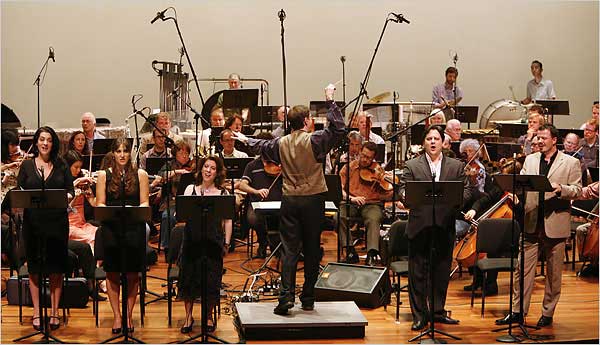
Though the struggling New York City Opera has been mostly absent this season, it was in the center of things over the weekend. On Friday night and Saturday afternoon it presented Vox 2009, its 10th annual showcase of excerpts from new operas performed in concert by City Opera singers and the City Opera orchestra. The operas are typically works in progress or completed works awaiting proper productions.
For the free showcases on Saturday afternoon, the Skirball Center for the Performing Arts at New York University was packed. Four of the five works presented on this occasion represented deliberate attempts by their composers to push the boundaries of the opera genre, for better or worse. In video interviews that preceded each performance, and in program notes, opera was described as the ultimate medium for musical exploration, and conservative gatekeepers were deplored.
Of course, if opera tells stories through words and music, there is only so far you can push it before it becomes something else. And experimentation should be no excuse for poor craftsmanship.
Take “Invisible Cities,” with music and libretto by Christopher Cerrone, adapted from the novel by Italo Calvino. The opera tells of the emperor Kublai Khan, who, fearing that he is losing hold of his vast kingdom, listens to reports from the young explorer Marco Polo, who has traveled its remote and fantastical regions.
All of our lives lead to decay, Mr. Cerrone said in the video interview. His opera, he added, is about “finding a certain joy in that.”
In his orchestral score Mr. Cerrone uses a prepared piano and electronic instruments to evoke exotic sounds and an ethereal atmosphere. But in the 30-minute excerpt, the dramatic pacing was static and the vocal writing cumbersome. When the text is sung, the vocal lines are almost continually slow, sustained and ponderous. When things pick up, the words are almost always either spoken or chanted in monotones.
The composer Anne LeBaron approached text-setting much the same way in an excerpt from her opera “Crescent City,” with a libretto by Douglas Kearney. In the story an imagined city (a metaphorical stand-in for New Orleans) is trying to recover from a devastating hurricane. The characters include ghost cops and a voodoo queen. Strange things happen.
Ms. LeBaron, who salutes renegade composers like Meredith Monk and John Cage, who upended the opera genre, seems to think that by using electronic gadgets and drawing from vernacular pop genres she can make her score automatically experimental. But the vocal writing is like a cliché of pompous contemporary opera excess, with lines full of sustained chanting and pointlessly complicated leaps. Like Mr. Cerrone, Ms. LeBaron resorts to patter or speech when the text needs to be gotten through quickly.
Jonathan Dawe’s “Armide,” with a libretto by Heather Raffo, was inspired by Lully’s French Baroque opera of the same title. In fact, Mr. Dawe refashions stretches of Lully’s score with modern music twists in this work, which sets the story in postwar Iraq, in 2019. Mr. Dawe describes his opera as “Baroque music on steroids.”
But when transforming old music into something new, it is not enough to rewrite the original with a lot of wrong notes, extraneous harmonies and wandering inner voices, then throw in some orchestral craziness.
The last work showcased was by far the best. “A Bird in Your Ear” by the composer David Bruce and the librettist Alasdair Middleton is a fairy-tale opera about a nightingale and a privileged young boy, Ivan, who yearns to know what the birds are saying. After saving some baby birds from a severe storm, Ivan is granted his wish by their magical mother.
Mr. Bruce found a model for this work, he said, in Stravinsky’s dance cantata “Les Noces.” The story is told through short scenes with connecting narration. The music, rich with imagined folk tunes, undulant accompaniment patterns and vibrant choral writing, is delicate, tartly tonal and lucidly orchestrated.
The characters are enchanting, and the vocal writing mostly effective, except for Mr. Bruce’s often flawed prosody, the art of setting words to music in a way that conveys the natural patterns of speech. It may not have been the best decision to have the narrative sung, for the most part, by a trio of women. The words are sometimes garbled by elaborate three-part harmonies.
In context on this long afternoon of excerpts, “A Bird in Your Ear” offered an object lesson: it is better for an opera to be skillfully written and imaginative, however conventional, than to be experimental and inept.
The singers, many very gifted, gave their all to these pieces. And with limited rehearsal time, the City Opera chorus and orchestra performed impressively under a roster of able conductors. The company’s full-time players and choristers seemed gratified to have some work to do for a change.

|
Recent news items |
Most popular posts |
All works are available through billholabmusic.com. |